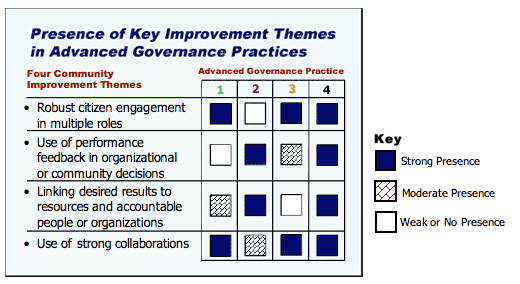Auditors can use Effective Community Governance to frame the context of their overall government auditing practice, from performance auditing, to auditing the reliability of performance information, to encouraging better results-based governance practices. Auditors can also use the Effective Community Governance Model and related community improvement themes as criteria to assess:
- Relevant Performance Measures
- Performance Management and Accountability for Results
- Effective Governance Practices
Relevant, Reliable Performance Measures
Why were the San Jose sewer cleaning crews only cleaning clean sewers? Because they were primarily rated on the miles of sewers they cleaned, so they skipped dirty sewers, which slowed down them down as they tried to rack up lots of cleaning mileage. That’s an example of how important it is to ensure that performance measures are relevant. There are many possible criteria for the relevance of performance measurement, such as timeliness and relationship to an organizations goals or objectives. Effective Community Governance provides examples of two important criteria that can be used for relevance. A relevant set of measures should include:
- Measures that are results-oriented
- Measures related to citizen priorities
For example, a change from only focusing on output measures to more relevant measures of results in San Jose sewers made a key difference, leading to a new goal and service strategy to obtain results, not just sewer cleaning mileage. A program that demonstrates both a results-orientation and relevance to citizen priorities is the City of Santa Monica Sustainability Plan. City sustainability staff engaged people with a wide range of interests in a major update of the plan, shifting its focus from just the environmental sustainability of the city government to a broader focus on sustainability in the whole community. That led to new indicators of sustainability based on eight goal areas identified through the engagement process. To make measurement results-oriented, the city developed a two-pronged grading system to assess the performance of the city and community in working towards benchmarks in their sustainability goal areas. First, a letter grade for each of their eight goal areas is assigned by analyzing all of the indicator data for that goal area. Next, a grade for effort made towards the goal by the city government is assigned. The city developed the grading system in cooperation with citizens, and the grades have become reliable indicators of progress across time.
Auditors who test and help improve the reliability of government performance data support effective governance by helping to increase citizen confidence in reported government performance information, which can increase citizen engagement and use of performance data. Criteria and tools for testing reliability are available at the Auditor Roles in Performance Measurement website.
Performance Management and Accountability for Results
Two major Effective Community Governance improvement themes relate directly to performance management and accountability for results:
- Use of performance feedback in organizational or community decisions
- Linking desired results to resources and accountable people or organizations
Checklists to Help Develop Criteria and Assess Practices
Through best practice research of high-performing government and community organizations, the Results That Matter Team developed checklists of good practices for these and other improvement themes. Auditors can use the checklists to help develop criteria for assessing performance management and accountability for results. Auditors and managers can also use the checklists to assess the extent of use of good practices by government organizations:
- Download Performance Feedback Good Practices Checklist [.doc]
- Download Results, Resources, & Accountability Good Practices Checklist [.doc]
Examples of Performance Management and Accountability for Results
There are many illustrations of effective performance management (or “managing for results”) and accountability for results in the book Results That Matter or on this website. A few follow.
- San Jose not only cleaned up their sewers, they also developed a simple, direct performance management system for sewer cleaning involving a single performance feedback cycle. The feedback on differing sewer conditions and results gives them the ability to step outside their previous one-size-fits-all service strategy and plan actions to respond differently to the varying sewer conditions in different neighborhoods. The managing for results cycle is completed by implementing their planned actions, measuring and then reassessing results, feeding that information back into operational plans, and making service adjustments to continue improving results.
- Organizations can also benefit from more complex managing for results systems, by obtaining performance feedback and making improvements at different levels, from day-to-day service delivery, to improving program design, to improving resource allocation and how programs are measured, as in the “triple loop leaning” model of organizational learning.
- In a real case of multiple performance feedback cycles, Prince William County, Virginia, has multiple feedback loops in its “results oriented government” system which keeps budget priorities and service goals aligned with a citizen-driven strategic plan, helps assure planned service levels are attained and improvements are made as needed, and accountability for results desired by citizens is achieved through measurement and public reporting.
- The City of Charlotte, North Carolina, long a pioneer in managing for results, was the first city to apply the strategic balanced scorecard approach to the entire municipal organization. Each city department has a balanced scorecard consistent with the overall city government scorecard and includes initiatives and performance measures for managing the department strategy, creating performance feedback and accountability to ensure department program results are aligned with overall city policy goals set by the Charlotte City Council. At the ground level, the Charlotte Neighborhood Development agency commissions quality of life studies, and feeds back the results to drive investment in specific neighborhoods with the greatest needs for improvement. They also convene neighborhood cabinets from city and county departments to ensure accountability for implementation, and they engage citizens to become accountable to each other for improving their own neighborhoods.
Effective Governance Practices
Auditors can evaluate how well their government implements and supports effective governance practices, as suggested by the Effective Community Governance Model and related ideas.
A fundamental principle of effective governance is that citizens are not just passive customers of services, but they can be engaged in many roles to improve their community. A community that gives citizens opportunities to play many roles can gain many ways to take advantage of citizens’ ideas, skills, resources, and energy. A government or nonprofit organization strengthens citizen engagement in governance when it supports citizens in engagement roles.
- There are five main citizen roles in effective community governance and key variations on several of those roles.
- This “Quick Guide” has a sampling of fourteen ways to support citizens in engagement roles.
- Download a Worksheet for Assessing Support for Citizens in Engagement Roles [.doc]
Improvement Themes Provide Basis for Assessing Advanced Governance Practices
These four key community improvement themes emerged time and again in our research on community and organizational examples of effective governance:
- Robust citizen engagement in multiple roles
- Use of performance feedback in organizational or community decisions
- Linking desired results to resources and accountable people or organizations
- Use of strong collaborations
The presence of these themes in a community, and a government’s support for these themes, provide a good barometer for whether the following “Advanced Governance Practices” of the Effective Community Governance Model:
An auditor can use the improvement themes as criteria for assessing the use and effectiveness of advanced governance practices. The chart below provides a key to which themes should be present for the effective use of each of the four advanced governance practices.

The Results That Matter Team has developed checklists of good practices for each improvement theme, which managers and auditors can use to assess how strong each theme is in a community or organization. Also, auditors can use a combination of the good practice checklists for the themes and the chart above to help develop criteria for assessing the use and effectiveness of any of the four advanced governance practices.
- Download Citizen Engagement Good Practice Checklist [.doc]
- Download Performance Feedback Good Practice Checklist [.doc]
- Download Results, Resources, & Accountability Good Practice Checklist [.doc]
- Download Collaborations Good Practice Checklist [.doc]
In depth case studies and examples of communities and organizations using the four Advanced Governance Practices are in the book Results That Matter.
- List of Examples and Case Studies in the Book Results That Matter
For briefer examples of government and non-profit organizations using the four Advanced Governance Practices, see the Model in Action.

